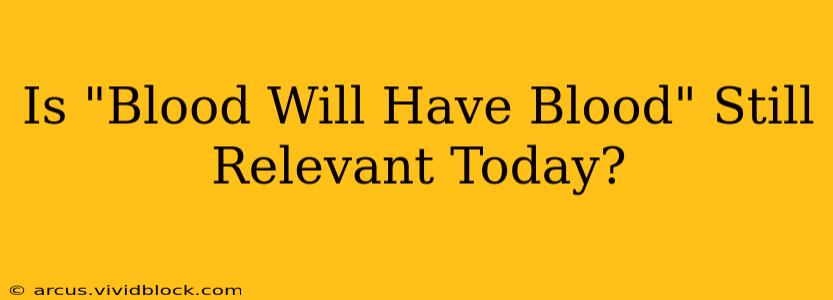The phrase "blood will have blood," a chillingly poetic expression of revenge and retribution, originates from the ancient world and continues to resonate in modern society. While its literal interpretation – the cyclical violence of revenge killings – remains a stark reality, its relevance extends far beyond simple physical bloodshed. This exploration will delve into the enduring power of this phrase, examining its historical context, its modern manifestations, and its continuing relevance in our complex world.
What Does "Blood Will Have Blood" Mean?
The phrase’s most straightforward meaning centers on the idea of revenge. A violent act inevitably leads to further violence, a cycle of retribution where each act of bloodshed fuels the next. This concept is rooted in ancient cultures, appearing in various forms throughout history, reflecting a deeply ingrained human instinct for retaliation. It’s a primal response, a sense of justice, however brutal, that demands satisfaction.
Where Did the Phrase Originate?
While the exact origin is difficult to pinpoint, the sentiment is ancient. The phrase, or variations of it, appears in various literary and historical contexts. It’s most famously associated with Shakespeare's Titus Andronicus, where the line powerfully encapsulates the play’s brutal cycle of vengeance. However, the underlying concept predates Shakespeare, appearing in earlier works and reflecting a common understanding of justice, honor, and retribution prevalent across cultures.
Does "Blood Will Have Blood" Apply Only to Physical Violence?
No, the phrase's relevance extends far beyond physical violence. While the imagery is undeniably visceral, the concept of cyclical retribution applies to numerous aspects of modern life. Consider:
- Political Conflict: Escalating tensions between nations or factions often mirror the "blood will have blood" dynamic. An aggressive action triggers a counter-response, escalating the conflict and leading to further suffering.
- Social Injustice: Systemic injustices and oppression can ignite cycles of protest and repression, fueling further resentment and violence. The lack of justice breeds further acts of defiance, creating a self-perpetuating cycle.
- Cyberbullying and Online Harassment: The relentless nature of online abuse can create a similar pattern. An initial act of aggression may spark retaliatory attacks, further escalating the conflict and causing lasting emotional damage.
Is the Cycle of Violence Inevitable?
No, the cycle of violence is not inevitable. While the impulse for revenge is deeply ingrained, it’s not an inescapable fate. The phrase highlights a dangerous pattern, but it doesn't dictate our actions. Breaking the cycle requires:
- Empathy and Understanding: Understanding the root causes of conflict, acknowledging the suffering of all parties involved, and fostering empathy can be crucial steps towards de-escalation.
- Justice and Accountability: Fair and impartial justice systems can help address grievances and prevent further violence. Holding perpetrators accountable for their actions is crucial in breaking the cycle.
- Conflict Resolution and Mediation: Effective conflict resolution strategies and mediation can help parties find peaceful solutions and prevent violent escalation.
How Can We Break the Cycle of "Blood Will Have Blood"?
Breaking the cycle of violence demands conscious effort and societal change. This involves:
- Promoting peace and non-violent conflict resolution: Education and awareness campaigns focusing on alternative dispute resolution methods are essential.
- Addressing systemic issues that fuel violence: This includes addressing poverty, inequality, and social injustice, which often contribute to conflict.
- Investing in mental health support: Providing access to mental health services can help address the underlying causes of violence and prevent future acts of aggression.
In conclusion, while the phrase "blood will have blood" evokes a powerful and disturbing image of cyclical violence, its relevance extends beyond literal bloodshed. Its enduring power lies in its capacity to capture the human tendency towards retribution and the devastating consequences of unchecked aggression. However, understanding the phrase's implications empowers us to actively work towards interrupting the cycle and building a more peaceful future. The challenge lies not in accepting the inevitability of violence, but in actively choosing a path of reconciliation, understanding, and justice.

